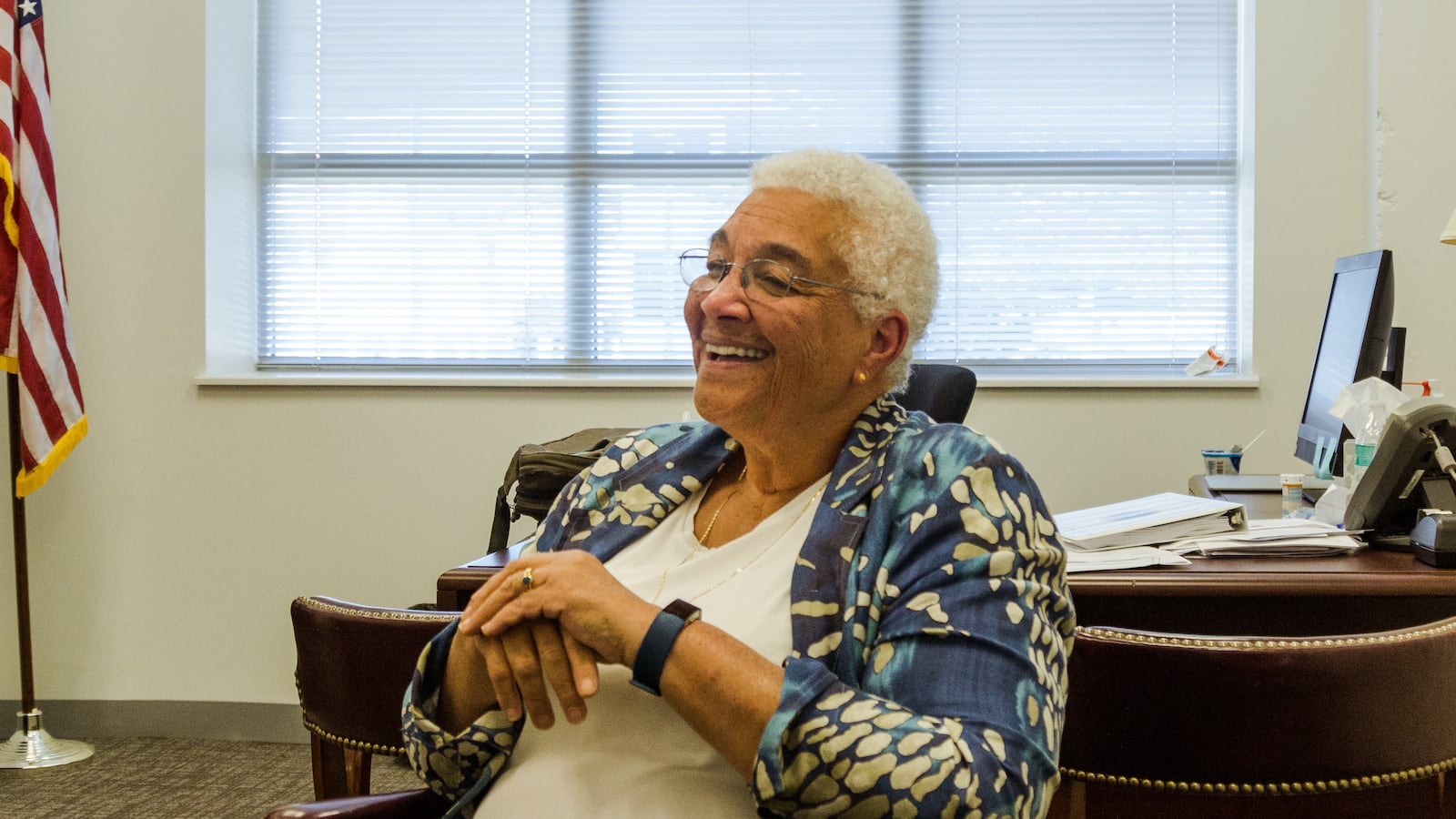This article was originally published in The Notebook. In August 2020, The Notebook became Chalkbeat Philadelphia.
Estelle Richman originally turned down Gov. Wolf when he asked her to join the School Reform Commission.
She thinks the SRC’s days are numbered but cautions against overestimating what local control would mean for the school system.
In the meantime, she thinks that the District – and particularly its selective schools – could do a better job of educating children with physical or behavioral problems.
And she thinks the city’s legislative delegation could be more effective in Harrisburg even as part of the minority party.
“This is my definition of ‘retirement,’” Richman said as she reflected on her five months on the SRC.
“You work just as many hours as you did, but you don’t get paid for it.”
In a wide-ranging interview at the SRC offices, Richman described herself as “still excited about this” despite the fact that it broke all her rules about what she was willing to take on after three decades of public service.
Her previous jobs included Pennsylvania secretary of welfare, chief operating officer of the U.S. Department of Housing and Urban Development, and top posts in Philadelphia government, including managing director.
In fact, she said, when she was called by a top assistant to Wolf and then by the governor himself, her answer was a flat “no.” She was on eight corporate boards already and at her age – she turned 74 this month – she wanted to leave time for personal travel.
Only when School Superintendent William Hite called her at Wolf’s behest did she agree to take the job.
It is a job she may not have for much longer. The SRC is under increasing pressure to disband itself before the gubernatorial election with its possibility that a Republican could take office, and sources say that it is planning to begin a public discussion of the legal issues involved at its meeting on Thursday, Oct. 19.
Richman said she welcomed the chance to help the District and city government work together more effectively and is enthusiastic about a pilot program to place more behavioral health workers in 22 schools. She is also a strong supporter of Mayor Kenney’s community schools initiative.
She said that she has already visited more than 10 public and charter schools, but that some of her most valuable insights into the overall quality of the local system came from fellow board members of the W. T. Grant Foundation, which makes many education grants.
Compared with other large urban systems, she said, “Philadelphia is right there in the pack. But Philadelphia has a reputation for trying innovative things.”
She cited the recent opening of Vaux Big Picture High School as a community school and neighborhood hub.
Richman, who holds a master’s degree in clinical psychology, has long been an advocate for improving the education of children with physical, learning, or behavioral health challenges, and this is where she feels the city could do a better job.
“Too many times, these are the kids who don’t get educated,” she said, “who wind up unemployed, or dead or on the streets.
“It’s the kids who are traumatized. What do you do with a child who says he was up all night because there were shootings in the neighborhood? And now we’re saying, ‘Sit down and do your math?’”
Specifically, she is concerned that selective schools, both District and charter, may be too quick to screen out problem kids even if they have the intellectual ability to do the work.
“There’s nothing that says you can’t have a behavior problem and be gifted,” she said.
And she is concerned that some educators and parents don’t know about the federally funded services for which their children are eligible, through either Medicaid or CHIP, the Children’s Health Insurance Program.
“I think a lot of them don’t realize that a child has the right to be educated in the least restrictive setting possible,” she said.
“When will we be able to afford to really individually educate all our children? Chances are never. Can we do better? Absolutely.”
Two of the things that surprised her most when she joined the SRC, she said, were “how low our K-3 reading level was” and the overall contentiousness of some of the SRC meetings.
“I wouldn’t have thought there’d be so much anger involved."
The SRC may only be around for a few more months, she believes, but no one should think that a locally appointed school board will cure the system’s ills. Pointing out that neither the SRC nor its predecessor, the Board of Education, ever had taxing power, she said: “It’s not going to raise money.”
Help in that area will have to come from the city and the state. In Philadelphia, Richman has long had a good working relationship with Kenney, dating from the days when she was managing director and he was on City Council.
But Harrisburg is another story.
Here, she says, the local delegation could be more effective despite their minority status.
“I think that if the delegation got their act together and acted as a bloc, they’d be a force to be reckoned with,” she said. “There really hasn’t been an issue they could identify with and stick together like glue on."
A native of Wilmington, North Carolina, Richman grew up in Lynchburg, Virginia, and now lives in Chestnut Hill. She is divorced, with a son in the Denver area, a daughter in New Hope, Pa., and four grandchildren.
She said she is putting in 30-35 hours a week on SRC business, in addition to serving on seven other boards.
But when asked how long she expected to remain, she answered quickly: “As long as I think I can make a difference.”

